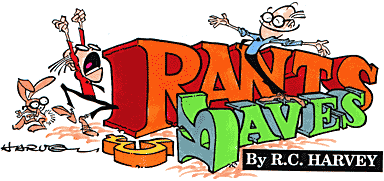 |
|
| Opus
Three: 1. Fan Satire. Fanboy is, of course, an in-group joke book. No one but a pretty hep funnybook fan can understand a lot of the gags. But the fourth issue ventures beyond in-group comedy. There's the usual crackling Mark Evanier verbal humor and the usual Sergio Aragones sight gags galore --the sort of shenanigans we've grown to know and love from Groo to shining Groo. Evanier makes us realize that there's something inherently wrong with a justice system in which plea bargaining works only if you plead guilty, and then you go free; if you plead not guilty, chances are, you serve time. (This is a contradiction in terms, aristotle--just in case you weren't watching closely.) And Sergio gives the running gag about the sleazy comic book store owner a visual boost by picturing the guy as a fat old fraud, bald except for frizzy hair around the edges, in the ever-present grease-stained T-shirt who eats junk food by the vat. (How many of these guys have you seen, and what do you think they're selling?) But this issue gets down
to business when it turns the spotlight on censorship. When Finster
hooks up with Sgt. Rock and Easy Company, they visit a German town where
the Nazis are busy burning books. The historical reference underscores
the evil inherent in shutting down comic book stores because of parents
who (always and for evermore in every time and place) disapprove of
the things their offspring wear, do, listen to, and read. And a Fredric
Wertham simulacrum shows up, too, in the person of Dr. Zensie ("zensie,"
Mark tells me, is German for "censor," German being Wertham's native
tongue, which left him with a distinctly Teutonic accent, a fact that
did not fail to excite some comment in the post-WWII era that Wertham
was testifying in). Apart from its satiric edge, Fanboy is also an astonishing
testament to the power of the medium that we accept so readily pictures
by such realistic artists as Jordi Bernet and Russ Heath through which
our hero Finster ambles in all his bigfoot finery (or bignose finery,
to cite that part of his anatomy that is carefully preserved from each
one of these Evaniverses to the other). Finster clearly "lives" in our
imaginations whether in jail with Bernet's ghoulish cell-dwellers or
on the battlefield with Heath's Sgt. Rock; and vice versa. Marie Severin's
segment highlights Bill Gaines' testimony before the so-called Kefauver
Committee investigating comic books as a cause of juvenile delinquency.
Gaines is quoted exactly (if not extensively): "What are we afraid of?
Are we afraid of our own children? Do we think our children are so evil
and simple-minded that it only takes a story of murder to set them to
murder?" I read this during the week following the slaughter at Columbine
High School in Littleton, Colorado, and the juxtaposition jolted. But
even as our self-serving politicians race to enact legislation against
being an adolescent, we must recall the rest of the Gaines Cautionary
Tale: Evanier tells us the Comics Code Authority came into being after
the Senate hearings, but he doesn't mention that, as a result of applying
the code stringently, all juvenile delinquency disappeared from the
land overnight. He doesn't mention it because it didn't happen. It didn't
happen, probably, because comic books don't, actually, cause juvenile
delinquency, so "cleaning" them up didn't eliminate criminal behavior.
Not then, not now. |
|

send e-mail to R.C. Harvey art of the comic book - art of the funnies - reviews - order form - main page |